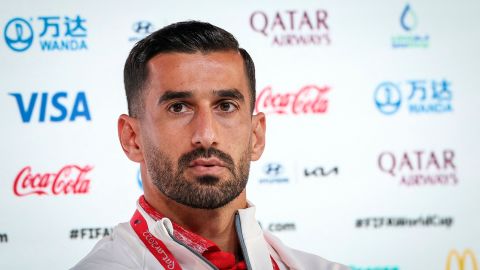Iranian captain Ehsan Hajsafi said his team sympathised with anti-government protests at home and his team should be a voice for the oppressed at a press conference in Qatar a day ahead of the country’s first World Cup match against England.
Hajsafi, an experienced defender began a press conference on the eve of Iran’s World Cup opener against England by extending his sympathies to the loved ones of victims of the regime’s deadly crackdown on anti-government protesters.
Unprompted, the 32-year-old defender opened the press conference with a remark on anti-government protesters in Iran. “They should know that we sympathise with them,” he said, before adding, “conditions at home are not good”.
More than two months of protests in Iran, sparked by the death of Mahsa Amini, a 22-year-old woman who died in custody, have created one of the boldest challenges to the Islamist regime since the 1979 revolution.
Iran’s national team has been in the spotlight in the run-up to the World Cup in Qatar, with anticipation over whether players will use football’s showpiece event as a platform to show solidarity with the protest movement.
More than two months of protests in Iran, sparked by the death of Mahsa Amini, a 22-year-old woman who died in custody, have created one of the boldest challenges to the Islamist regime since the 1979 revolution.
Iran’s national team has been in the spotlight in the run-up to the World Cup in Qatar, with anticipation over whether players will use football’s showpiece event as a platform to show solidarity with the protest movement.
“We have to accept the conditions in our country are not right and our people are not happy,” said Hajsafi. “We are here but it does not mean we should not be their voice or we should not respect them.”
The wave of unrest erupted in September after Amini died in custody of the morality police for wearing clothes deemed “inappropriate”. Iran’s government blames foreign enemies for the crisis.
The crackdown since Amini’s death has left nearly 400 people dead, according to Oslo-based group Iran Human Rights.
“Everything we have, we owe it to our people and we are here to work hard, to fight, to perform well on the pitch, to score goals and to dedicate ourselves to the people of Iran,” he said. “I hope the situation changes as the people wish and that everyone will be happy.”
The state’s response has led to questions over whether the team represents Iran or the regime that has ruled with an iron fist since the Islamic Revolution of 1979.
Football, politics and human rights
Some Iranian sportsmen and women have made gestures seen by protesters as shows of support, including not singing the national anthem or celebrating victories on the field.
Other members of the team have avoided discussion of politics in public so far. Players Karim Ansarifard and Morteza Pouraliganji refused to answer questions on Friday about solidarity with women in Iran. On Thursday, midfielder Alireza Jahanbakhsh, who plays for Dutch club Feyenoord, suggested such questions were a ploy to distract the team.
However, Bayer Leverkusen striker Sardar Azmoun was selected for the team despite having publicy supported the protests in the past.
Some activists have taken a stand against the national team for not doing enough, and called on Iranians to gather at main squares of cities and towns across Iran on Monday night.
A post on social media, which was difficult to verify given the crackdown on reporters in Iran, said: “No matter what result the hated team of the Islamic Republic gets, we will gather in the streets to celebrate the defeat of the Islamic Republic’s team while chanting revolutionary slogans.”
A banner of Iran’s national team was set on fire in Tehran, videos on social media showed.
Iran confirms strikes on Kurdish groups in Iraq
Monday’s match between Iran and England comes as Iran launched cross-border strikes against Kurdish opposition groups in Iraq, killing at least one fighter.
Iran’s Revolutionary Guards confirmed Monday they had launched cross-border missile and drone strikes overnight on Kurdish Iranian opposition groups in Iraq labelling them “separatist anti-Iranian terrorist groups”.
The groups “have been the target since the morning of a new series of missile and drone attacks by the ground force of the Revolutionary Guards”, they said in statement.
The government of Iraq’s autonomous Kurdistan region on Monday condemned “unjustifiable violations” following Iranian strikes. “The repeated violations that undermine the sovereignty of Iraq and the Kurdistan region are unjustifiable,” a statement by the Kurdistan Regional Government said.
The Iranian government also stepped up the suppression of persistent anti-government protests in the predominantly Kurdish areas of western Iran, from where Amini’s family hails.
Reinforcements of security forces were sent to the city of Mahabad in western Iran, rights groups said, while images and audio of heavy gunfire and screams were posted overnight.
Rights groups had earlier posted footage of defiant protests in Mahabad, including after the funerals of victims of the state’s crackdown on the protests, with people staging sit-ins in the streets and setting up barricades.
The Norway-based Hengaw rights group said “armed troops” had been despatched to Mahabad from Urmia, the main city of West Azerbaijan province.Hengaw said at least four protesters were killed in the Kurdish area.
“In Mahabad’s residential areas, there is a lot of gunfire,” it wrote on Twitter.
AFP


Leave a Reply
You must be logged in to post a comment.